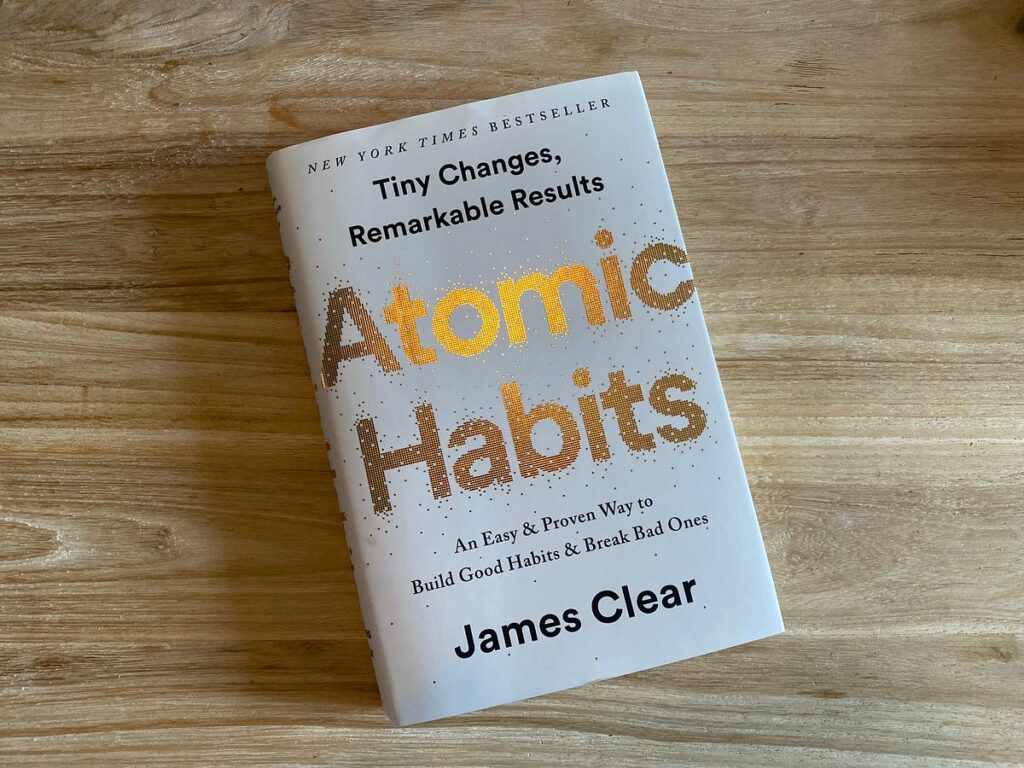Book Club Discussion: Atomic Habits by James Clear
Filed under:
Atomic Habits by James Clear book sold over 5 million copies since its launch in 2018! It’s been on the New York Times Best Seller list for over 100 weeks. It has a 5-star rating on Amazon and over 65000 reviews. If you want to improve your habits, it’s hard to miss this book. But does it live up to the hype?!
I am currently in the process of establishing some good habits and getting rid of some bad ones. So, I decided Atomic Habits would be a great place to start.

Quick Recap of Atomic Habits by James Clear
Atomic Habits by James Clear is a self-help book that delves into the power of small habits and how they can lead to remarkable personal and professional transformations. He emphasises that making small, incremental changes in our habits can have a compounding effect over time, resulting in significant improvements in our lives.
The book is divided into four parts, each focusing on a different aspect of habit formation.
Part 1, “The Fundamentals of Atomic Habits”
This part lays the groundwork for understanding the role of habits in our lives. He introduces the concept of the “habit loop,” which consists of a cue, a routine, and a reward. He emphasises the importance of identifying the cues and rewards associated with our habits and provides strategies for making positive changes.
Part 2, “The Four Laws of Behavior Change”
This part outlines a framework for creating and sustaining good habits. He introduces the four laws: make it obvious, make it attractive, make it easy, and make it satisfying. By following these laws, individuals can optimise their environment and increase the likelihood of forming desirable habits while breaking free from negative ones.
Part 3, “Advanced Tactics”
This part provides practical strategies for implementing atomic habits. He discusses the importance of habit stacking, which involves linking new habits to existing ones, and explores the role of mindset in habit formation. He also highlights the significance of tracking progress and making adjustments along the way.
Part 4, “The Downfall of Atomic Habits”
This part addresses the challenges and pitfalls that can hinder habit formation. He emphasizes the importance of staying committed to the process, overcoming plateaus, and avoiding the temptation to pursue immediate results at the expense of long-term success.
Throughout the book, Clear uses real-life examples, scientific research, and stories to illustrate his points. He offers practical advice and actionable steps for readers to apply the principles of atomic habits in their own lives. The central idea of the book is that small changes, when repeated consistently, can lead to significant and lasting transformations, helping individuals achieve their goals and unlock their full potential.
My Thoughts on Atomic Habits by James Clear
Overhyped?
After reading James Clear’s book, I must admit that I didn’t find it particularly insightful or impactful. Perhaps my disappointment stems from having read numerous self-help books before, and thus, the content didn’t offer much novelty. I’m genuinely surprised by its widespread popularity and feel that it may be overhyped.
While the book claims to be science-based, I found that not everything presented was necessarily true or beneficial. It often felt like Clear was expressing his opinions rather than providing solid evidence. Moreover, some of the mathematical explanations didn’t resonate with me. Clear emphasizes how small habits compound over time, even illustrating this with a questionable graph. However, I don’t entirely agree that all gains accumulate exponentially, as some improvements may follow a linear progression or diminish over time. e.g. benefits of exercising.
Too rigid
One aspect of the book that left me with mixed feelings is Clear’s “never miss twice” rule, especially considering its potential impact on mental health. On the one hand, I can see where he was going with that but for individuals prone to perfectionism, self-criticism, or black-and-white thinking, this rule may not be conducive to their well-being. It places a heavy emphasis on maintaining consistency, often disregarding the importance of self-compassion and the ability to bounce back after a setback. In my view, as long as we have a sufficient number of productive days and make substantial progress on those days, it’s acceptable to grant ourselves a break without fearing a significant setback.
Clear’s concept of linking habits to one’s desired identity intrigued me. According to him, habits serve as a means to shape our identity and facilitate genuine behaviour change. However, I believe it’s crucial to strike a balance between aspiring to become a better version of ourselves and recognising our current capabilities and energy levels. Constantly striving to meet the expectations of an idealised “kind of person” can lead to dissatisfaction and self-doubt.
In the pursuit of personal growth, I think it’s important to recognise the delicate balance between constant evolution and allowing ourselves to simply be human. While the desire to expand our positive habits is admirable, transforming every working hour of the day into a mental marathon is counterproductive and draining. Personal development isn’t supposed to feel tiring or heavy. You don’t have to make every moment an opportunity for productivity.
Discussion 1: The Four Laws of Behavior Change
The four laws of behaviour change—making it obvious, attractive, easy, and satisfying—are central to the book’s message.
Which of these laws resonated with you the most, and why?
Discussion 2: Habit Stacking
Habit stacking is a technique mentioned in the book that involves linking new habits to existing ones.
Can you think of any potential habit stacks in your life that could help you reinforce positive behaviours?
Discussion 3: Main takeaways
Reflecting on the book as a whole, what are the main takeaways or lessons that you will apply to your life? How do you see yourself implementing the principles and strategies discussed in Atomic Habits?

RATING of Atomic Habits by James Clear
I’d give this book 2 stars (out of 5).
Although this book didn’t resonate with me personally, I acknowledge that other people may find value in its concepts and strategies. I think it’s always best to approach self-help literature with a critical mindset and only take on board the advice that resonates and aligns with your own circumstances.
I’d love it if you left a comment. Feel free to tackle any of the discussion questions or simply spill the beans on what you thought about the book. No pressure, no deadlines—just a bit of fun!
How many stars would you give this book?

MORE BOOKS
If you enjoyed this review, please check out all the other books that I’ve reviewed.
| |||||||||||||||||||||||
I actually liked the book. Some good concepts and am actually implementing some of his strategies.
I am so happy you were very honest and transparent in your review. I did not care for this book….some of the points really resonated with me. I can take some positives away, but the time commitment was huge …..